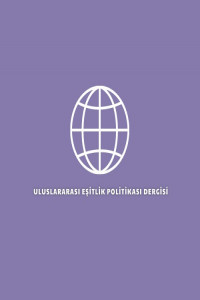SOME PSYCHOANALYTICAL AND PSYCHOLOGICAL APPROACHES TO THE ARMENIAN-TURKISH QUESTION: AN ASSESSMENT
Anahtar Kelimeler:
Forced Migration
SOME PSYCHOANALYTICAL AND PSYCHOLOGICAL APPROACHES TO THE ARMENIAN-TURKISH QUESTION: AN ASSESSMENT
The Armenian-Turkish question has a multidimensional content and its psychological dimension is only one among a few. After mentioning that the interaction among those dimensions shapes the future of the question, this article focuses on the psychological dimension using a psychoanalytical approach by Vamık Volkan and then an approach from social psychology. Thanks to these two approaches, it then tries to assess two other articles on the subject. Those two articles exemplify many others written by Turkish psychologists and psychiatrists on the psychological dimension. They are based on themes such as the guilt felt by Western societies after World War II, the abuse by the Armenian diaspora of developments on the subject of human rights, non-Turk Armenians’ “psychology of having excuses”, and identity crisis. According to Volkan’s approach, Armenian claims of genocide can be regarded as an “entitlement ideology” because we can find reasons for a sense of loss and humiliation on the part of Armenians in the Ottoman history. For example, they had not been regarded by the state as equal to Muslim Ottomans in some important respectsbefore Tanzimat Edict of 1839. Moreover, they had suffered Hamidian massacres in 1890s, when more than two thousand Armenians were killed. Thus we can assume the formation of a chosen trauma on the part of Ottoman Armenians, a trauma already tied to Armenian identity before WWI. The alternative social psychological approach helps us focus on the decision of forced emigration made by the Ottoman rulers. In other words, we can analyze that decision using the alternative, which can be called “person x environment”. This article assesses that the two exemplary articles lack a model or theoretical framework such as “person x environment” to be used while studying some of the psychological traits of the Armenian diaspora as well as of Armenians living in Armenia.
Keywords:
Forced Migration, Armenian Question, Ottoman Armenians Diaspora,
___
- Baskın, O. (2021). Ermenistan ve Ermeni politikası. In Baskın Oran (Ed.), Türk dış politikası: Kurtuluş Savaşı’ndan bugüne olgular, belgeler, yorumlar, cilt III (2001-2012) (pp. 163- 189). İletişim Yayınları.
- Erdoğan, E. (2014). Siyasal psikoloji siyasal katılım hakkında ne öğretebilir? Kocaeli Üniversitesi Siyasal Psikoloji Çalıştayı
- Göka, E. (2001). Ermeni sorununun (gözden kaçan) psikolojik boyutu. Ermeni Araştırmaları Enstitüsü. www.eraren.org/index.php?Lisan=tr&Page=DergiIcerik&IcerikNo=202
- Göral, S. (2007). Psikoloji ve psikanaliz penceresinden Türk-Ermeni meselesi: mağduriyet psikolojisi ve büyük-grup kimliğinin etkisi. Ermeni Araştırmaları Enstitüsü. www.eraren.org /bilgibankasi/tr/index4_1_1.htm
- Jasper, J. M. (2004). Intellectual cycles of social movement research: From psychoanalysis to culture?. In J. Alexander, G. T. Marx & C. Williams (Eds.), Self, social structure, and beliefs: explorations in sociology (pp. 234-253). University of California Press.
- Kévorkian, R. (2015). Ermeni soykırımı. İletişim Yayınları.
- Lewy, G. (2005). Revisiting the Armenian genocide. Middle East Quarterly 12(4), 3-12. https://www.meforum.org/748/revisiting-the-armenian-genocide
- McGraw, K. M. (2006). Why and how psychology matters. In R. E. Goodin & C. Tilly (Eds.), The Oxford handbook of contextual political analysis (pp. 131-156). Oxford University Press.
- Sears, D. O., Huddy, L., & Jervis, R. (2003). The psychologies underlying political psychology. In D. O. Sears, L. Huddy & R. Jervis (Eds.), Oxford handbook of political psychology (pp. 3-16). Oxford University Press.
- Sémelin, J. (2011). Arındırma ve yok etme: katliam ve soykırımın siyasi kullanımları. İletişim Yayınları.
- Smith, P. (2001). Cultural theory: an introduction. Blackwell Publishing.
- Veinstein, G. (1995). Trois questions sur un massacre. L’Histoire 187, 40-41.
- Volkan, V. D. (2008). Large-group identity, international relations and psychoanalysis. Deutsche Pschoanalytische Gesellschaft e.V. (DGP) Meeting.
- Volkan, V. D. (1985). The need to have enemies and allies: a developmental approach. Political Psychology, 4(2), 219-247.
- Başlangıç: 2021
- Yayıncı: Küresel Eşitlik ve Kapsayıcılık Ağı
Sayıdaki Diğer Makaleler
TARİH VE ULUSLARARASI İLİŞKİLER YAZINI DEĞERLENDİRMESİ; KÖRFEZ SAVAŞI ÖRNEĞİ
İKLİM ADALETİ BAĞLAMINDA SINIRLAR VE İKLİM GÖÇÜ
THE SOCIOPOLITICAL OCCURRENCE OF THE TALIBAN AND ITS IMPACT ON AFGHAN POLICY
Hüsamettin İNAÇ, Jeewash KOHISTANI
BELARUS SOVYET CUMHURİYETİ İÇ SİYASETİ VE BELARUS’UN BAĞIMSIZLIĞI SÜRECİ
Murat Bürkan SERBEST, Naira IRISKELDİEVA
SOME PSYCHOANALYTICAL AND PSYCHOLOGICAL APPROACHES TO THE ARMENIAN-TURKISH QUESTION: AN ASSESSMENT
GÖÇÜN GÜVENLİKLEŞTİRİLMESİ BAĞLAMINDA AVRUPA BİRLİĞİ’NİN BELARUS GÖÇMEN KRİZİNE YAKLAŞIMI
